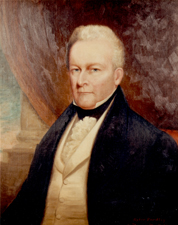Edward Lloyd (politician, 1779)
Edward Lloyd (born July 22, 1779 in Talbot County , Maryland , † June 2, 1834 in Annapolis , Maryland) was an American politician who represented the state of Maryland in both chambers of the US Congress and between 1809 and 1811 its governor was.
Early years and political advancement
Edward Lloyd came from a prominent family in his home country who had been in Talbot County since the early 17th century. The progenitor of the politically active family was Edward Lloyd II (1670-1718), who was colonial governor of the Province of Maryland from 1709 to 1714 . His son Edward Lloyd III (1711-1770) was the father of Edward Lloyd IV (1744-1796). This was 1783-84 delegate for Maryland in the Continental Congress . His son Edward Lloyd V (1779-1834), so the great-grandson of the colonial governor, was between 1809 and 1811 governor of the US state of Maryland . After all, his grandson Henry Lloyd (1852–1920) was also Governor of Maryland from 1885 to 1888. This series includes six generations.
He enjoyed private training in his home country. His political career began in 1800 with his election to the Maryland House of Representatives . He held this mandate until 1805. Between 1807 and 1809 he represented his state in the US House of Representatives in Washington . There he moved up for the resigned Joseph Hopper Nicholson .
Governor of maryland
On June 9, 1809 he was elected by the Maryland Legislature to succeed Robert Wright , who resigned on May 6, as the new governor of that state. During the period between May 6 and June 9, 1809, the office of governor of Maryland was served on an acting basis by James Butcher . A year later, Lloyd was confirmed in this office, so that he could remain in office until November 16, 1811. During his tenure, the franchise was changed to the effect that in the future you would have the right to vote after one year in the state of Maryland. It had been two years until then. The governor supported the federal government's trade embargo against France and England under President James Madison .
Promotion to the US Senate
During the War of 1812 , Lloyd served as an officer in the Maryland Militia. Between 1811 and 1815 he was a member of the Maryland Senate . In 1818 he was elected as a candidate for the Democratic Republican Party in the US Senate . There he succeeded Robert Henry Goldsborough . Edward Lloyd remained in Congress until his resignation on January 14, 1826. In the Senate, he chaired the committee that dealt with the affairs of the District of Columbia . After his resignation, Ezekiel F. Chambers took over his Senate seat.
Another résumé
Between 1826 and 1831 he was again in the Maryland Senate, in 1826 he was its President. Edward Lloyd died in 1834. He had seven children with his wife, Sally Scott Murray. His grandson Henry Lloyd was also to become governor of Maryland between 1885 and 1888.
Slaveholders
Lloyd had his possessions processed by numerous slaves and as a politician always defended slavery. The Afro-American abolitionist Frederick Douglass , who as a child had been the slave of a white employee of Lloyd and had lived for a time on Lloyd’s main plantation, reports in his autobiographies of the brutalities that Lloyd’s overseer committed against the slaves (including reports of a murder). In his first autobiography, published in 1845, Douglass writes about the tyrannical treatment of Lloyd himself with his slaves:
Colonel Lloyd couldn't take a slave to object. When he spoke, the slave had to stand, listen, and tremble; and so it was literally. I saw Colonel Lloyd have old Barney, a man between fifty and sixty, bare his head and kneel on the cold, damp earth. Then he gave him more than thirty lashes on his bare shoulders, hunched over from long, hard work.
Web links
- Edward Lloyd in the National Governors Association (English)
- Edward Lloyd in the Biographical Directory of the United States Congress (English)
- Edward Lloyd in the database of Find a Grave (English)
Individual evidence
- ↑ The Narrative of the Life of Frederick Douglass An American Slave Full text from Project Gutenberg
| personal data | |
|---|---|
| SURNAME | Lloyd, Edward |
| BRIEF DESCRIPTION | American politician |
| DATE OF BIRTH | July 22, 1779 |
| PLACE OF BIRTH | Talbot County , Maryland |
| DATE OF DEATH | June 2, 1834 |
| Place of death | Annapolis , Maryland |



